
Did you know getting a restful night’s sleep can be just as crucial to creating a healthy lifestyle as eating clean and exercising regularly?
Many of us are not getting nearly enough sleep each night.
In fact, the Institute of Medicine recently released a study conducted by the Committee on Sleep Medicine and Research with some shocking findings.
They projected anywhere from 50 to 70 million Americans are battling with chronic sleep disorders.
They predict the long term effects of lack of sleep can have a myriad of detrimental effects on our health; from obesity to hypertension, diabetes and even heart attack and stroke. It’s time to get serious about getting more sleep.
The researchers at the National Sleep Foundation (NSF) may just have the answer we’ve all been looking for to sleep better!
After a monumental two year study combining the nation’s foremost experts on sleep, they released an entirely new sleep chart, including their expert recommendations of the maximum and minimum hours of sleep across your lifespan.
Check out their findings below to see their sleep suggestions.
Newborns (0-3 months): 14-17 hours
Infants (4-11 months): 12-15 hours
Toddlers (1-2 years): 11-14 hours
Preschoolers (3-5): 10-13 hours
School-age children (6-13): 9-11 hours
Teenagers (14-17): 8-10 hours
Younger adults (18-25): 7-9 hours
Adults (26-64): 7-9 hours
Older adults (65+): 7-8 hours.
Want to learn more? Click here to read their full study.
Now that you have an idea how much sleep you may need, it’s time to do some experimenting with the Bedtime Calculator.
It’s an amazing tool that can help you on your journey to getting more sleep each night. All you need to do is plug in how many hours you want to sleep each night. Start by using the research from the NSF as a guide.
It can help you not only find out what time you need to wake up, but what time you need to hit the hay in order to get a full night’s sleep.
Your quality of sleep affects everything from the way your brain and body function to your safety and overall quality of life.
Even though you’re sleeping your brain is hard at work building new neural pathways for you to take on whatever comes your way the next day.
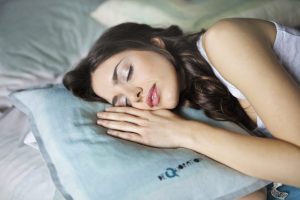
Therefore, lack of sleep can affect your ability to recall old information as well as learn new facts. It can make it nearly impossible to stay awake or function during important tasks like driving.
Sleep is also the perfect time for your body to repair itself after a long day.
For example, your blood vessels and your heart need time to repair each night. Without adequate sleep, you run the risk of developing high blood pressure, heart disease, kidney disease, diabetes, obesity, and stroke.
Did you know that sleep deficiency can even affect your ability to fight off colds or infections?
Start your day off with some sunshine. A recent study out of Wyckoff Heights Medical Center in Brooklyn found that sunlight is incredibly effective for not only waking you up each day but also in getting to bed on time. Researchers found that exposure to natural light actually helps your body produce melatonin, often referred to as the “sleep hormone.”

The more melatonin your body produces at night, the easier it is to fall asleep and stay asleep.
The NSF conducted a massive sleep survey in which they found a strong correlation between “successful sleepers” and adults who made their bed every morning. An astounding 7 out of 10 people who made their bed were almost 19% more likely to have a good night’s sleep.
Having trouble catching enough Zs? Your mattress might be to blame. Mattresses can be giant magnets for pesky allergens like mold, or dust mites, that may keep you sneezing or itchy throughout the night.
Do yourself a favor and seal your mattress as well as your pillows and box spring; especially if you suffer from chronic asthma.
Many Americans suffer from chronic back and shoulder pain. An old mattress or lumpy pillow could further exacerbate the pain and make it next to impossible to get to sleep.

According to a study released by Oklahoma State University something as simple as changing your mattress can reduce back stiffness by as much as 59% and improve the overall quality of your sleep by 60%.
Remember NSF’s massive sleep poll? They also found that a cleanroom could be the difference between a full night’s sleep or restlessness.
In the morning, set aside a couple of minutes to straighten up your room so you don’t have to worry about it when you’re ready for bed at night.
Natural light is excellent during the morning, but it can destroy your ability to sleep if your bedroom is too bright at bedtime.
Sleep experts partnered with Harvard Medical School to study the harmful effects of light on sleep. Invest in a set of blackout curtains to keep the light out and get a good night’s sleep.
It may surprise you but new research out of The University of Richmond, highlighted the effects of color on your quality of sleep.
If you’re having a hard time falling asleep, it may be time to redecorate your bedroom. Opt for calm and serene colors with a matte finish.
According to the NSF , It’s important to create a strong relationship between your bedroom and sleep.
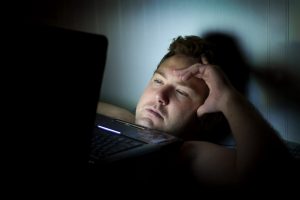
While it might be tempting to pull out your laptop and work in bed, don’t do it! Make sure to save the bedroom for sleeping only.
Quite often the answer to why we aren’t getting enough sleep during the night has a lot to do with what you’re doing or not doing during the day. We all have busy schedules, which makes it difficult to keep track of our routines.
That’s why so many sleep experts at the NSF stress the importance of keeping a Sleep Diary. Track your daily habits to see if you can spot patterns that may be contributing to poor sleep.
It can be tempting to hit the snooze button, especially after a long night of tossing and turning.
What’s the problem with snoozing your morning alarm? Remember, your body has a natural sleep and wakeful pattern, or circadian rhythm, waking up with your initial alarm essentially restarts the cycle.
While it might seem like those extra 5 minutes aren’t a massive deal, it can actually disrupt your circadian rhythm and leave you feeling even groggier.
According to an article published by Harvard Medical school, mindfulness meditation could be the secret to getting more peaceful sleep and combating insomnia.

Dr. Benson suggests carving out 20 minutes during the day to sit quietly and focus on your breath for a better night’s sleep.
Move your TV out of the Bedroom: Did you know our screens emit a specific type of light that actually makes it more difficult to fall asleep at night?
According to recent research by Harvard Medical School light can virtually stop your body’s ability to produce enough melatonin to sleep. The easiest way to resist the urge to turn on the TV right before bed is to move it out of the bedroom.
It’s not enough just to start your day with sunlight. Try to find ways to fill your days with more sunlight if you’d like a more restful night’s sleep.

Not only can sunlight help to increase the quality of your sleep, according to research produced by Cornell Medical College increased sun exposure can even reduce the time it takes you to fall asleep by an astounding 83%.
There are several studies highlighting the detrimental effects of smoking on sleep.
For instance, the University of Wisconsin found smokers tend to experience symptoms associated with that lead to sleep disturbances throughout the night like coughing and sleep apnea.
The UCLA Medical School has found a link between movement and sleep. Try starting your morning with a few stretches! All it takes is 15 minutes a day and you could improve your sleep by as much as 30%.
Don’t forget to stay active throughout the day if you’d like to improve the overall quality of your sleep. Check out Northwestern University’s newest research on how daily exercise can radically improve the effects of insomnia.
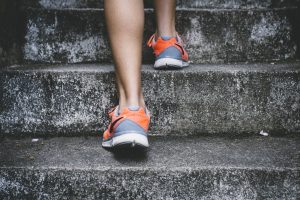
According to their most recent findings, adults who exercised regularly throughout the day were able to fall asleep faster. In fact, it cut the time it took to fall asleep by half. That’s not all! Participants also got an extra 41 minutes of sleep each night.
Many Americans find it difficult to stay asleep because of snoring. UF Medical School did an in-depth study and found that losing weight could dramatically reduce snoring at night.
Some participants were actually able to eliminate snoring altogether.
A short nap shouldn’t have adverse effects on your ability to sleep, according to sleep experts at Columbia University.
In fact, a “cat nap” could actually help you sleep better at night as well as help you function better during the day.
But there is a limit!
What’s the ideal amount? Experts suggest you try to stick to afternoon naps that are around 30 minutes or less.
Making a morning schedule that includes a consistent wake-up time could actually help you fall asleep and stay asleep easier at night.
According to a sleep study published by the University of Pennsylvania School of Medicine, sticking to a sleep schedule helps to regulate your circadian rhythm.
Switching your wake up time too frequently can even disrupt the level of melatonin your body produces at night.
It can be tempting when you’re running late in the morning due to a night of poor sleep to skip breakfast altogether just to make it to the office on time.
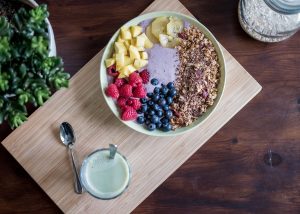
The truth is, skipping breakfast can actually harm your ability to get a good night’s sleep later. Researchers at Purdue University found that a nutritious breakfast can improve your overall sleep quality. Try a bowl of cereal with a side of fruit and nuts to start your day.
According to a study conducted by Florida State University eating heavy meals at night could adversely affect your ability to get a good night’s sleep.
Try scheduling your meals a week in advance. You can even meal prep to keep you on track. Just make sure to each your largest meal earlier in the day so you have time to digest it.
Researchers at the University of Michigan conducted a study about the effects of chamomile on sleep quality. After 28 days, they found that the participants were not only able to fall asleep much faster, about 15 minutes quicker, they also woke up less throughout the night.

Swap out your morning cup of coffee for a mug of chamomile tea and you may begin to see an improvement in your quality of sleep.
Did you know your diet can have a massive impact on your ability to fall asleep and stay asleep? Researchers at Columbia University released new research detailing the many ways what you eat during the day could actually improve your sleep quality.
They found the more fiber participants consumed in a day the better they slept at night.
A study published by Oxford Academic and the American Journal of Clinical Nutrition found a high carb diet could actually help you fall asleep faster.
The participants were given a meal including Jasmine rice, a high carb starchy snack, and managed to fall asleep in just 9 minutes.
Walnuts may just be the sleep snack aid you’ve been looking for. According to new findings out of the University of Texas, walnuts are jam-packed with melatonin a hormone that is essential in creating a restful night’s sleep.
If you’re feeling hungry before dinner, instead of grabbing a bag of chips, snack on a handful of walnuts.
The afternoon/midday slump encourages many Americans to grab a second cup of coffee in order to stay awake and finish out the day strong.
However, the sleep experts at Henry Ford Hospital found that your afternoon cup of coffee could affect your body’s ability to fall asleep.
They found that even drinking a cup of caffeine 6 hours before bedtime could keep you up at night. If cutting caffeine cold turkey is too tough, consider weaning yourself off by substituting it with decaf. You can have all of the flavor and still get a good night’s rest.
If you’re tossing at turning at night you may be suffering from Gastroesophageal reflux disease (GERD). Researchers at Mayo Clinic studied the effects of GERD on further disturbing sleep.

Spicy food can further irritate GERD and can actually be the cause of why you may not be able to stay asleep at night.
Sleep apnea is a sleep disorder that affects a surprising amount of adult Americans. The sleep research team at the University of Wisconsin of
School of Medicine found that around 9% of women and around 24% of men could potentially have sleep apnea.
It can be tricky to identify at first because of the nature of the disorder; basically, you stop breathing consistently for short periods of time throughout the night.
The symptoms are essentially feeling exhausted during the day or snoring at night. If you’re concerned about whether you may also have sleep apnea, it’s best not to try and don’t self diagnose.
Book an appointment with your doctor to learn more.
Your general practitioner may suggest you work with a sleep specialist. There are mountains of research suggesting that therapy can reverse insomnia and other common sleep disorders.
Cognitive behavior therapy (CBT) has helped countless Americans overcome insomnia by helping them virtually change their relationship to sleep. According to Dr. Melton at the University of Colorado, CBT can even help cancer patients stop being preoccupied with getting enough sleep so they can have a full night’s sleep.
While we all know how difficult it can be to get enough sleep if your room is too noisy the sleep experts at Rhode Island Hospital and Brown Medical School took their research one step further.

They used a white noise generator and noted how dramatically their patient’s quality of sleep improved with the intervention of white noise. Participants stayed asleep longer despite all of the noise within the intensive care unit.
If you live in an area with a lot of loud traffic at night, you may want to consider purchasing a white noise generator to minimize external noise and sleep through the night.
There are several studies highlighting the importance of room temperature in promoting restful continuous sleep in test subjects. Harvard University partnered with several sleep specialists in a monumental study longitudinal study from 2002 through 2011 which proved how even a slight temperature elevation can disrupt sleep.
You’ll want to figure out the temperature that’s right for you. Start at around 70 degrees and adjust your thermostat to find the perfect temperature for you.
Chronic pain can wreak havoc on your ability to get a full night’s sleep. If you are struggling with getting comfortable at bedtime, or find yourself waking up in the middle of the night, then your posture may be the culprit according to a study published by Utica College.
They found that the design of your mattress may further exacerbate back pain. Consider using a leg pillow at night to help correct your spinal alignment and ease back pain.
Do your feet get chilly at night? Harvard University identified a link between body temperature and restlessness.

If you find yourself tossing and turning at night, slip on a pair of your favorite socks. It just might help you sleep better at night!
Obstructive sleep apnea can cause insistent snoring and keep you up all night, according to the sleep specialists at Wisconsin University.
One of the easiest ways to combat snoring and get better sleep is to change your position at night. Instead of sleeping on your back, try sleeping on your side.
If you are sleeping with your pets but waking up exhausted, it may be time to try something new, according to an article published by the Mayo Clinic.

Researchers aren’t necessarily suggesting you kick your dog or cat out of your bedroom, but they did find having an animal in bed versus in the bedroom on the floor can greatly impair your ability to have a full night’s sleep.
In certain cases a relaxing massage can dramatically affect your ability to fall asleep. In fact, according to the University of Arkansas’ College of Nursing critically ill patients have a much more difficult time falling asleep than many of us.

They found that a short back massage, only 6 minutes long, resulted in a significant difference. They slept for an hour longer!
One of the first goals in getting better sleep is to calm your mind and body down.
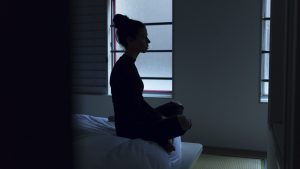
Sleep researchers at the University of North Texas found that yoga has an amazing ability to encourage both your brain and body to wind down. Especially, when coupled with deep breathing exercises.
A few hours before your scheduled sleep time, treat yourself to a relaxing bath or shower. According to Dr. Shahab Haghayegh, a researcher at The University of Texas at Austin, found that a warm bath, for 90 minutes, not only improves the overall quality of your sleep, it can even help you get deeper more rejuvenating sleep as well.
One major reason you may have trouble falling asleep is because your mind is racing. Instead of getting caught up in a mess of busy thoughts right before bed, wind down with a good book.
A new study mapped the ways in which relaxing before bed helps to lower steroid levels as well as regulate your circadian rhythm.
A busy brain can be the biggest enemy of a good night’s sleep. A study published in the Journal of Experimental Psychology found that writing a “To-Do” list before bed greatly reduced bedtime worry. It gave participants a chance to flesh out their worries, instead of obsessing over them throughout the night.
According to psychologists Robert Emmons and Michael McCullough adopting an “attitude of gratitude” could remarkably affect your ability to sleep at night.
After just three weeks of having their patients keep a nightly list of 10 things, they were grateful for, their clients reported having a more restful nights sleep.
Our screens emit “blue light.” According to researchers at Harvard Medical School, blue light hampers our ability to produce melatonin because it essentially tricks our brains into assuming it’s still daylight. Experts recommend avoiding screens about 2 hours before bedtime.
It’s pretty normal to set an alarm to wake up in the morning, but have you ever considered setting a bedtime alarm?

According to the American Diabetes Association, irregular bedtimes can greatly decrease your overall health. Set an alarm to solidify a consistent schedule.
Resist the urge to diverge from your bedtime during the weekends. Remember, according to recent research, you’re body thrives on a consistent schedule to remain healthy.
If you can’t manage to log off before bed at least set your phone and computer screen to a “blue light filter” about 2 hours before bed. The filter will not disrupt your body’s natural melatonin production or circadian rhythm.
There are countless studies proving the positive effects of melatonin and sleep. The Department of Military and Emergency Medicine published research on just how effective melatonin is at helping you cope with jet lag and insomnia. Melatonin may alter your brain chemistry, check with your doctor before including it in your nighttime routine.
Aromatherapy is the latest craze sweeping the nation. According to the Psychology Department at Wesleyan University, lavender is not just a fad.
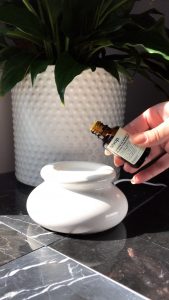
They found that distilled lavender oil could be used as a mild sedative to increase the overall quality of your sleep.
There are several scientific links between alcohol and sleep apnea. If you’re having issues falling asleep, snoring excessively, or wake up repeatedly throughout the night, try cutting alcohol entirely out of your diet.
If you’re going to have a glass of milk, make sure not to have it too close to your bedtime or it may keep you up at night. Nocturia is essentially having the urge to urinate several times throughout the night.
Drinking too much before bed could interrupt your sleep and leave you exhausted the next morning. Experts recommend cutting liquids approximately 1-2 hours before bed.
While it can be hard to avoid the occasional late-night snack, bingeing too late at night could negatively impact your ability to fall asleep.

Researchers at Northwestern University concluded that late-night eating can disrupt your circadian rhythm and also attribute to rapid weight gain.
Kiwi cannot only curb your late night sugar craving but it can also help you fall asleep faster.
Sleep researchers at Columbia university found that adults who ate two kiwifruits an hour before bed fell asleep 42% faster.
Making your sleep a priority doesn’t have to be difficult! You can start off small, pick 2-3 tips to incorporate into your morning and evening routines. You should start to notice a difference in the quality of your sleep after a few weeks of following a consistent routine. Please don’t hesitate to contact a medical professional if you’re worried about your sleeping habits. We’re here to help!
https://www.ncbi.nlm.nih.gov/pubmed/20669438
https://www.sleephealthjournal.org/article/S2352-7218%2815%2900015-7/fulltext
https://www.sleepfoundation.org/bedtimecalculator
https://www.ncbi.nlm.nih.gov/pmc/articles/PMC6281147/
https://www.ncbi.nlm.nih.gov/pubmed/24394440
https://www.ncbi.nlm.nih.gov/pmc/articles/PMC3839957/
https://www.ncbi.nlm.nih.gov/pmc/articles/PMC3576835/
https://www.ncbi.nlm.nih.gov/pubmed/11896375
https://www.ncbi.nlm.nih.gov/pmc/articles/PMC3047226/
https://www.researchgate.net/publication/299451922_Does_Room_Color_Affect_Serenity_and_Sleep_Quality
https://academic.oup.com/sleep/article/35/2/287/2558899
https://www.ncbi.nlm.nih.gov/pmc/articles/PMC2290997/
https://jamanetwork.com/journals/jamainternalmedicine/fullarticle/2110998
https://www.ncbi.nlm.nih.gov/pmc/articles/PMC3047226/
https://www.ncbi.nlm.nih.gov/pubmed/8340561
https://www.ncbi.nlm.nih.gov/pubmed/8078854
https://www.ncbi.nlm.nih.gov/pmc/articles/PMC5385214/
https://www.ncbi.nlm.nih.gov/pubmed/20813580
https://www.ncbi.nlm.nih.gov/pubmed/7750319
https://www.ncbi.nlm.nih.gov/pubmed/17053484
https://www.ncbi.nlm.nih.gov/pubmed/12941057
https://www.ncbi.nlm.nih.gov/pmc/articles/PMC6215927/
https://www.ncbi.nlm.nih.gov/pmc/articles/PMC4425165/
https://www.ncbi.nlm.nih.gov/pmc/articles/PMC3198755/
https://www.ncbi.nlm.nih.gov/pmc/articles/PMC5015038/
https://academic.oup.com/ajcn/article/85/2/426/4649589
https://www.ncbi.nlm.nih.gov/pubmed/15979282
https://www.ncbi.nlm.nih.gov/pubmed/24235903
https://www.ncbi.nlm.nih.gov/pmc/articles/PMC2879818/
https://www.ncbi.nlm.nih.gov/pubmed/8464434
https://www.ncbi.nlm.nih.gov/pmc/articles/PMC6570518/
https://www.sciencedirect.com/science/article/abs/pii/S1389945704002242
https://advances.sciencemag.org/content/3/5/e1601555
https://www.sciencedirect.com/science/article/abs/pii/S2352721815001400?via%3Dihub
https://advances.sciencemag.org/content/3/5/e1601555
https://jamanetwork.com/journals/jama/article-abstract/198600
https://www.mayoclinicproceedings.org/article/S0025-6196(17)30486-X/fulltext
https://www.ncbi.nlm.nih.gov/pubmed/9656043
https://www.ncbi.nlm.nih.gov/pmc/articles/PMC3667430/
https://www.sciencedirect.com/science/article/abs/pii/S1087079218301552?via%3Dihub
https://www.ncbi.nlm.nih.gov/pubmed/10271532
https://psycnet.apa.org/record/2017-47677-001
https://www.ncbi.nlm.nih.gov/pmc/articles/PMC3047226/
https://care.diabetesjournals.org/content/early/2019/05/21/dc19-0596
https://www.ncbi.nlm.nih.gov/pmc/articles/PMC4273450/
https://www.ncbi.nlm.nih.gov/pubmed/16298774
https://www.ncbi.nlm.nih.gov/pubmed/7077345
https://www.ncbi.nlm.nih.gov/pubmed/7077345
https://www.centerwatch.com/clinical-trials/listings/condition/592/nocturia/
https://www.ncbi.nlm.nih.gov/pubmed/19730426
| Mon-Thurs | 9:00 – 5:00 |
| Friday | 8:00 – 12:00 |
| Weekends | Closed |
Pinellas Internal Medicine Associates
10707 66th St N Suite A
Pinellas Park , FL 33782
click for directions

IF YOU ARE IN THE UNITED STATES AND ARE EXPERIENCING A MEDICAL EMERGENCY, DIAL 911 OR CALL FOR EMERGENCY MEDICAL ASSISTANCE. THE INFORMATION FOUND AND GENERATED FROM THIS WEBSITE (THE “WEBSITE”) INCLUDING BUT NOT LIMITED TO THE TEXT, IMAGES, LINKS, AUDIO, VIDEO, EMAILS, EBOOKS OR OTHER FORMATS IS STRICTLY FOR YOUR GENERAL INFORMATION ONLY. THIS WEBSITE DOES NOT OFFER ANY SPECIFIC MEDICAL ADVICE FOR YOU AND NOTHING ON THE WEBSITE IS INTENDED TO CONSTITUTE PROFESSIONAL ADVICE FOR MEDICAL DIAGNOSIS OR TREATMENT. YOU SHOULD NOT RELY ON INFORMATION RECEIVED VIA THIS WEBSITE FOR MEDICAL, LEGAL OR FINANCIAL DECISIONS. ALWAYS CONSULT WITH AN APPROPRIATE PROFESSIONAL FOR SPECIFIC ADVICE RELATED TO YOUR SITUATION. FOR MORE INFORMATION PLEASE READ OUR FULL TERMS AND CONDITIONS BY CLICKING HERE.